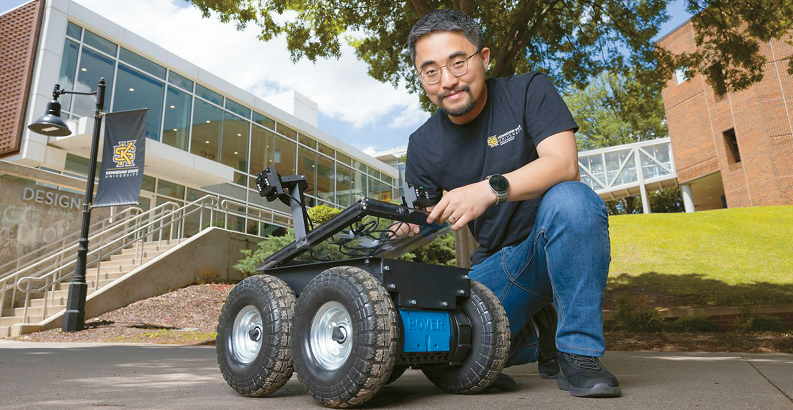A Korean professor at Kennesaw State University in Georgia has developed an artificial intelligence-powered robot that removes pests from strawberry farms without using pesticides, drawing attention from the agricultural tech community.

The robot, named MocoBot, was created by Professor Taeyeong Choi of the university’s Information Technology Department. According to a recent report by the Kennesaw State campus newspaper, MocoBot can automatically detect and remove slugs and snails that damage strawberry crops. It operates autonomously at night using AI-based object recognition software and a night vision camera.
Unlike traditional pest control methods that rely on chemicals, MocoBot uses a small mechanical arm to physically pick off pests. The robot has received praise for its environmentally friendly approach, eliminating the need for pesticides.
Choi’s team designed MocoBot to be practical for field use. It measures about 1 cubic foot, allowing it to easily maneuver through farm rows. It can navigate autonomously using sensors and has been trained to avoid damaging crops during operation. The robot identifies the size and movement of slugs and snails with machine learning, and removes them using its arm after detection via night vision camera.
Although MocoBot is still in the prototype stage, it is currently being tested at Kennesaw State’s experimental farm. The project is supported by the Sustainable Agriculture Research and Education (SARE) program. Choi said the robot’s autonomous night operations help reduce both labor costs and pesticide use.
In an interview with the campus newspaper, Choi added that the robot was built using a low-cost platform and a simple AI model to make it accessible to small-scale farms. “By targeting pests with smart technology, farmers can reduce crop loss while protecting the environment,” he said. “Even without a high-performance robot, MocoBot can deliver effective results in the field.”
BY HYOUNGJAE KIM [kim.ian@koreadaily.com]
![Troublesome delivery robots damage gardens, snarl streets Delivery robots in urban areas including LA Koreatown and Hollywood have been involved in a string of incidents, blocking fire engine responses, crossing police lines at active scenes, and colliding with homes and motorcycles. [KTLA • Reddit capture]](https://www.koreadailyus.com/wp-content/uploads/2026/02/0226-delivery-robot-compile-100x70.jpg)
![Nonprofit leaders accused of diverting millions meant for the vulnerable Judy Baca, who faces allegations of embezzling $5 million, participates in work on “The Great Wall of Los Angeles” mural in 2023. [Sangjin Kim, The Korea Daily]](https://www.koreadailyus.com/wp-content/uploads/2026/02/0226-nonprofit-1-100x70.jpg)
![Family of army veteran killed in San Antonio shooting launches fundraiser A screenshot of the GoFundMe fundraising page created for Kyung Chang Lee. Donations are being collected to support the family of Lee, who was killed in the San Antonio, Texas, shooting. [GoFundMe capture]](https://www.koreadailyus.com/wp-content/uploads/2026/02/0225-KyungChangLee-100x70.jpg)
![Cartel leader’s killing sparks unrest, prompts Koreans to reconsider Mexico trips Downtown Guadalajara in Mexico’s state of Jalisco, which resembled a war zone on February 22 amid arson and other violence by drug cartel members, appears quiet on February 24. The area, usually crowded with tourists and residents, saw a sharp decline in foot traffic and public transportation use. [Pablo Lemus Navarro/X account]](https://www.koreadailyus.com/wp-content/uploads/2026/02/0225-Mexico-100x70.jpg)